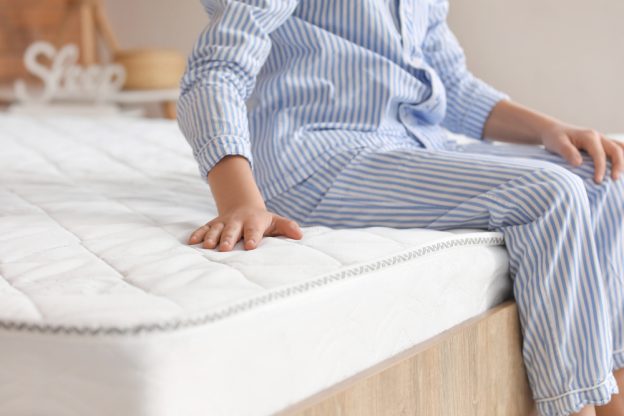Did you hear that today is World Sleep Day? The global event falls on the 17th March of every year. The event is hosted by the World Sleep Society. The theme for 2023 is “Sleep is Essential For Health”. The aim of this global event is to spread awareness of sleep health and sleep problems.
What’s also interesting is that March is also known as National Bed Month. This is another similar awareness event held within the UK, in partnership with The Sleep Charity and the National Bed Federation. The purpose of this national event is to promote the health benefits of good sleep to the public.
To mark these two awareness events, we thought it would be a great idea to discuss the topic of mattresses. A mattress is the foundation to a good night’s sleep. A good mattress can help massively with better sleep, thus improving sleep health. In this article, we discuss why a mattress needs to be replaced and how often it should be replaced.
Why Does A Mattress Need to Be Replaced?
As a general rule, a mattress should be replaced every 6 or 8 years. Of course, a mattress can last longer and start to age at 10 years. It depends on the person’s sleeping circumstances, the type of mattress, and its current condition, to name a few.
There are a few reasons why every mattress needs to be replaced eventually. Sleeping on an old mattress is less supportive than a new mattress, so the chances of developing bed aches and pains increases. This can make sleeping quite uncomfortable. Most people think their back pain is caused by something else but the problem could be down to their mattress simply being too old. Luckily, there are a few other signs to tell if a mattress needs to be replaced.
Signs of An Old Mattress
1) Sagged or Damaged Areas
Unfortunately, the nature of wear and tear can’t be prevented. Sagging occurs when the coils in a mattress begin to weaken, or the memory foam starts to lose its original shape. Holes, springs poking out and other damage are clear indicators that the mattress is on its last legs.
2) Bad Smell and Stains
No matter how much a mattress is cleaned or vacuumed, some smells and stains won’t budge. Old mattresses have a build-up of dead skin cells, sweat, pet hair, and even mould spots. Food and liquid stains can be difficult to remove. These permanent stains can be a factor as to why mould spots have appeared on a mattress.
3) Noisy Springs
The sound of creaking and squeaking of springs can affect a person’s ability to fall asleep. Noisy springs generally means the inner metal coils are either broken or starting to age. Unfortunately, there are not a lot of ways to fix the squeaking, besides completely replacing the mattress.
4) Increased Allergies
When a mattress has a build-up of dust or mould, this can make allergy symptoms worse for some people. Waking up regularly with a runny nose, watery eyes, or a headache can mean the allergens in your mattress could be causing it. For allergy sufferers, it may be worth replacing your current mattress with an anti-allergy mattress or a mattress with hypoallergenic fillings.
5) Lifestyle Changes
Even if a mattress is in top condition, a lifestyle change can be a sign to replace a mattress. A more supportive mattress is generally needed when a person is going through pregnancy or weight gain. People with a recently diagnosed health condition including arthritis, sciatica, or fibromyalgia will need a new mattress for better pressure relief.
Find Your New Mattress at The UK Bed Store
If you have noticed any of the above signs, it’s time to throw out your current mattress and invest in a high-quality, comfortable, and supportive mattress. We recommend doing this sooner rather than later to help you get better sleep and prevent future sleeping problems.
As the UK’s leading online bed retailer, we have an extensive range of products at competitive prices including mattresses, bed frames, headboards, divan beds, bedroom furniture, accessories to go along with them. If you have any questions about our mattresses or any of our other products, please feel free to contact us.

